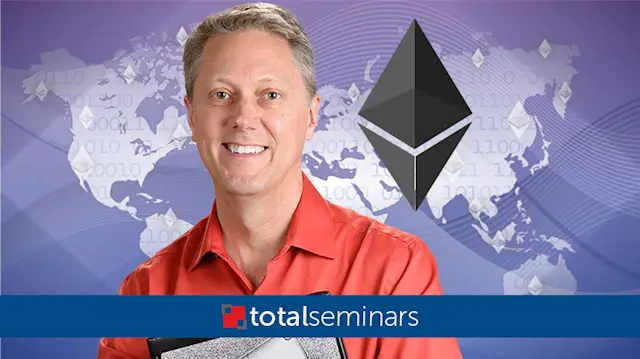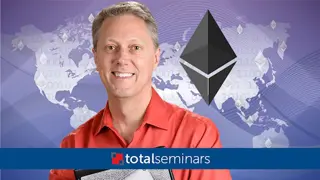- Reed courses certificate of completion - Free

TOTAL: Building an Ethereum Blockchain App.
Learn about revolutionary blockchain technology AND build your very own Ethereum dApp
Total Seminars, LLC
Summary
Overview
The Total Seminars Team, your source for the best IT industry courses, bring you TOTAL: Building an Ethereum Blockchain App with one of our most popular authors, Michael Solomon, Ph. D., CISSP, PMP, CISM.
This is NOT a boring voice-over-PowerPoint course. Michael speaks to you and presents the material in an engaging interactive style that will keep you interested and make it easier to understand. Check out the free sample lectures and you will see the difference.
With 30+ years of experience in security, privacy, blockchain, and data science, and an energetic presentation style, Michael takes his proficiency and consolidates it into this informative and engaging course.
This course starts with an explanation of blockchain and Ethereum and their applications. You'll then learn how to create an actual Ethereum dApp (decentralized application) using a real world supply chain example. This course dives into coding a "smart contract," and Michael walks through the steps one at a time, so this course is great for novices and experienced programmers alike.
Certificates
Reed courses certificate of completion
Digital certificate - Included
Will be downloadable when all lectures have been completed
Curriculum
-
Introduction 01:58
-
What is Blockchain? 1:13:57
-
What is Ethereum? 52:36
-
The Ethereum Ecosystem & Development Lifecycle 59:49
-
Ethereum Development Tools 32:25
-
Your Ethereum Wallet 34:49
-
Building Your First Ethereum App 43:24
-
Learning About Smart Contracts 1:49:54
-
Your Supply Chain Smart Contract dApp 2:13:11
-
Testing Ethereum Apps 1:21:58
-
Deploying and Maintaining Ethereum Apps 45:05
-
Integrating Non-Blockchain Apps with Ethereum 39:21
Course media
Description
WHY SHOULD I TAKE THIS COURSE?
Did you know:
-
Spending on blockchain solutions is estimated to jump from $1.5 billion in 2018 to over $16 billion in 2024*
-
26% of companies plan on investing between $1 million and $5 million in blockchain technology*
-
32% of companies are currently in the development stage of blockchain projects*
Whether you're an executive who can see the trends happening here, or a tech who's interested in understanding this new technology, or a geek looking to expand their coding knowledge, this course is for you.
The first wave of the "Bitcoin blockchain" has come and (mostly) gone, but now there's a greater implication for blockchain technology, and Ethereum is the word everyone needs to know. Find out how this technology will change YOUR industry. Learn to code smart contracts that will revolutionize business processes as we know them today.
What are you waiting for? Grab this course now!
You will Learn:
Blockchain is the latest buzzword, and it’s not just about cryptocurrency any more
We'll start simple, learning all about blockchain and Ethereum; for those who want to dig deeper, you'll also learn to code a smart contract using a real-world example
For the beginners, you'll walk you through the parts of Ethereum, coding basics, the software development life cycle, and everything you need to know to create your very own dApp, or decentralized application
For the more experienced, you can skip right to where you code your own smart contract using Solidity
We'll cover the tools you'll need to write smart contracts: Go Ethereum (Geth) blockchain client, Ganache test blockchain, Truffle development environment, and Microsoft Visual Studio Code IDE
You'll also create an Ethereum wallet using MetaMask and learn how to connect to private and public blockchains, including mainnet
Understand blockchain mining, tokens and ether (ETH), initial coin offerings (ICOs), the Ethereum Virtual Machine, gas prices and limits, and more
WHAT'S INCLUDED?
-
Over 10 hours of video
-
PDF of notes for each chapter
-
Downloadable project files with the sample code so you can follow along
-
A real-world project where you learn how to code a smart contract for an actual supply chain solution
-
End-of-chapter quizzes to test your knowledge
-
Q&A section where you can ask any questions you might have
-
Certificate of completion
WHAT'S COVERED?
-
Learn the basics
-
Chapter 1 - What is Blockchain?
-
Chapter 2 - What is Ethereum?
-
-
Understand Ethereum and its development tools
-
Chapter 3 - The Ethereum Ecosystem & Development Lifecycle
-
Chapter 4 - Ethereum Development Tools
-
Chapter 5 - Your Ethereum Wallet
-
-
Learn how to build an Ethereum dApp
-
Chapter 6 - Building Your First Ethereum App
-
Chapter 7 - Learning About Smart Contracts
-
Chapter 8 - Your Supply Chain Smart Contract dApp
-
Chapter 9 - Testing Ethereum Apps
-
Chapter 10 - Deploying and Maintaining Ethereum Apps
-
Chapter 11 - Integrating Non-Blockchain Apps with Ethereum
-
Sign up today!
Who is this course for?
Everyone nowadays should have a basic understanding of blockchain technology and the way it can revolutionize many industries, this course will teach you all about blockchain
For those looking for more, this course will also take you through how to write an Ethereum smart contract using the Solidity language
Anyone who is interested in the fascinating technology behind blockchain, and how to create applications that offer greater transparency, traceability, efficiency, and resilience while lowering cost
Requirements
There are no specific prerequisites as the course covers all the topics in detail.
A basic familiarity with programming, particularly JavaScript, is helpful but not necessary
Career path
This course is an introduction to the world of Blockchain and will launch you on a Blockchain coding career path.
Questions and answers
Currently there are no Q&As for this course. Be the first to ask a question.
Reviews
Legal information
This course is advertised on reed.co.uk by the Course Provider, whose terms and conditions apply. Purchases are made directly from the Course Provider, and as such, content and materials are supplied by the Course Provider directly. Reed is acting as agent and not reseller in relation to this course. Reed's only responsibility is to facilitate your payment for the course. It is your responsibility to review and agree to the Course Provider's terms and conditions and satisfy yourself as to the suitability of the course you intend to purchase. Reed will not have any responsibility for the content of the course and/or associated materials.


